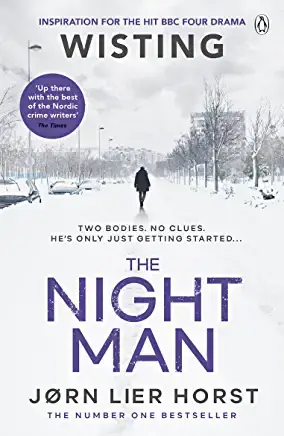This review includes some minor spoilers.
The Night Man is the fourth of Horst’s Norwegian thrillers I’ve read. All feature William Wisting. He’s introduced with a first name now, which is barely mentioned in the previous books. We’ve recognised him in the past as a policeman, popular with colleagues and a good father to his adult daughter, but now, perhaps, we will get to know him better as a man.
The murder at the centre of this story is a particularly gruesome one and the opening, with a woman finding a dead girl’s head looming through an early morning mist, is classic Scandi noir. There is little in the way of clues, and the police procedural elements of the story are well constructed. We see Wisting leading his team as they identify the body and trace the events that have led to her death. Wisting has always been presented as a competent policeman but I felt that in this story we saw more about his leadership qualities and how he pulled the team together. Bits of it, I thought, could almost be used in training courses for managers.
The story is long and quite complicated but, in essence, straightforward. Refugee children are being kidnapped by a drugs gang which uses them to run narcotics across the border from Sweden. The murder victim is a girl who, for no fault of her own, has failed to deliver the drugs.
The story could hardly sustain a full-length novel on its own, but we meet Wisting’s journalist daughter, Line, again. Although she is now working in Oslo, coincidence brings her to visit her father just as the murder story breaks. As in the previous books, she finds herself investigating the murder as well. Desperate to get the story ahead of competing news organisations, she uses her own contacts in the criminal class and her experience with uncovering links on the internet to move toward solving the murder. Her father’s approach and hers lead them to the same conclusions at almost the same time. Line’s interference, though, does mean that, yet again, her life is threatened by the crooks she is hunting. This is becoming a recurring theme in these novels and, given that Line is clearly an intelligent and able young woman, I can’t see why she never seems to learn from these mistakes. The ‘damsel in distress’ trope is common in these sorts of books (it’s not as if I never use it myself) but here it is beginning to come over as a tad formulaic. Even so, the prose is fluid and the requisite level of tension is maintained and Horst definitely spins a good yarn.
The story is strengthened by the development of Wisting and Line as characters. Wisting is allowed to start a tentative relationship with a civilian while we see Line struggling to succeed in a hugely competitive job whilst trying to build her own personal life.
The book is, I feel, weakened by occasional moralistic inserts. One character lectures Wisting at length about the problems faced by young refugees and there is a lot of criticism of Norway’s immigration policy. Wisting follows one witness to Afghanistan. This seemed slightly implausible but it was used as a way to comment on the awfulness of life in Afghanistan and the efforts being made by Norwegian police and troops to improve things there. There are also what seemed like mini-essays on the evils of the drugs trade.
I’m all in favour of authors using their stories to carry a political message but this is always more effective if the political message is well integrated into the. In this case the messages read like rather clumsy product placement. This is particularly unfortunate in the case of the Norwegian involvement in Afghanistan where, in the light of subsequent events, I think that every country which was there is taking a long, hard, critical look at what was achieved and at what cost.
Is the book worth reading? If you’ve never read any of Horst’s books before, this would be an odd one to start with. If you have been following Wisting’s progress and enjoying the books so far, you will probably enjoy this one, although maybe not quite as much as some of the earlier volumes. I felt this book marked difficult points in a series when the author wants to introduce new ideas and new characters and this means a sort of gear change, which is not necessarily that smooth. Even so, Horst has set things up well for another sequel and I look forward to seeing that.

